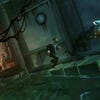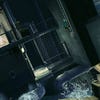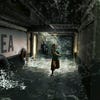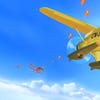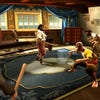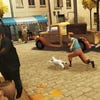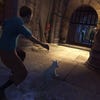The Adventures of Tintin: The Secret of the Unicorn
Pardon my glove.
Unicorn's quietly pretty, too, if you can overlook the fact that Tintin will probably never look right in anything other than Indian ink, and that Haddock has a little of both Saddam Hussein and the Yorkshire Ripper to him in his new incarnation - which is probably not what they were going for.
Characters aside, Ubisoft's art team draws everything from storm clouds to canyons and underwater tunnels with a pastel-coloured clarity that suits the Tintin universe well, while animations are packed full of classic poses, and fights erupt in a knockabout cacophony of wind-chimes, ringing bells, and cuckoo clocks.
It's got great personality, and you'll wish that the designers had the courage to see that this was enough. As a 2D platformer, Tintin's a delight. What lets it down, though, are all the moments when it isn't a 2D platformer - and there are quite a few of them throughout the course of the adventure.
Plane flights, scent-tracking jaunts with Snowy, motorbike chases: all of these interludes provide a little variety, but they're unconvincing in execution and a bore to play through. With sleepy steering and feeble weapons, Unicorn makes for a poor arena dog-fighting game and it's even worse when it comes to bike combat.
Lamest of all, though, are the on-rails sword-fighting sections. Playing as Sir Francis Haddock in a series of flashbacks, you parry and slash awkwardly at a selection of cloned foes and occasionally knock a bomb back in the direction of whoever threw it at you. It's understandable that Ubisoft might want to pad out a rather slight adventure, but it's hard to feel these moments add much beyond a little light spectacle and some pointless busywork.
What makes Unicorn's quest for variety strange as well as irritating is the fact that the game's already found a far more successful means of extending the fun anyway. Local co-op - a campaign of platforming gauntlets set within Haddock's nightmares - is absolutely magnificent: both frantic and intricate as you and a friend work your way through a series of surreal dreamscapes hunting for treasure.
The environments could have been plucked straight from the books' stranger moments - fire places that float in mid air, lifts that look like gramophone records, giant figures watching from the background. At times, the level design is more inventive here than it is in the main adventure, and the bosses are certainly better.
Each character comes with their own skill - Tintin, for example, can fire off a grappling hook, Haddock can move crates and bust through walls, and Castafiore can double-jump and break glass - and every mission requires you to work together to move through the environment, while you fight bitterly for every last piece of gold and silver. If you've played Four Swords much, you'll know about the kind of uneasy alliances this dynamic can create.
It's annoying that Unicorn works so hard to undermine itself sometimes, but in the end, it's hardly a fatal flaw. The game's best levels can be truly brilliant, like a co-op stage that twists and rebuilds itself around you as you move from one switch to the next, or a sneak through the oily decks of the Karaboudjan that plays like Metal Gear Solid 2 directed by Chuck Jones.
Its worst moments, meanwhile, tend to be dull rather than actually frustrating, and are always out of the way fairly quickly, too. It's not perfect, perhaps, and the whole thing feels pretty slight, but The Secret of the Unicorn's clever and deeply charming - a Tintin game for everybody, and not just the super-fans.


